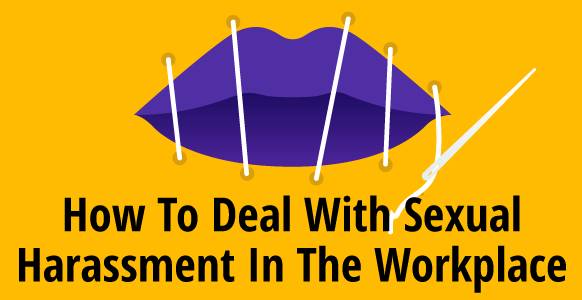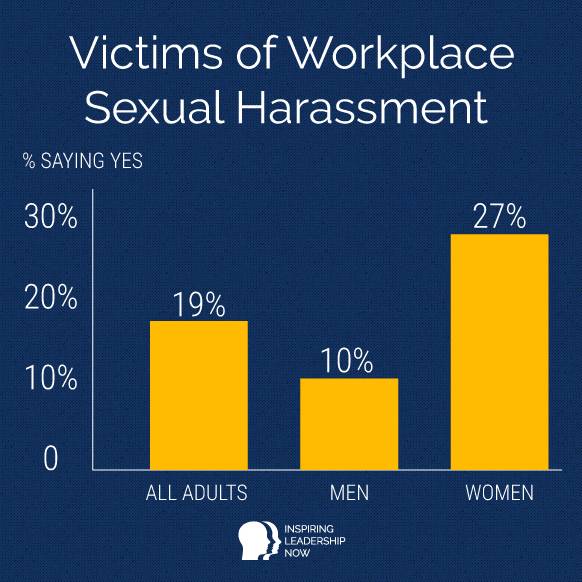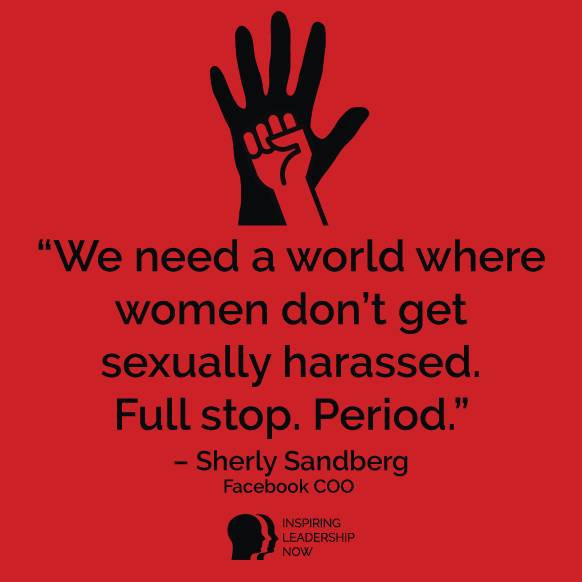Last updated: 29 August 2019

As a leader in 2017, you may not think it’s necessary to know how to deal with sexual harassment, but sadly, it’s still big issue…
In fact, according to recent statistics, approximately 27% of women have been victims of sexual harassment at work.
It’s not just women, of course, but they are almost 3 times more likely to be sexually harassed than men.
What’s more… these numbers don’t really represent reality, as sexual harassment often goes unreported. So the numbers are likely to be much higher.
According to psychotherapist and author Beverly Engel, there are many reasons why your employees (or even yourself) might be afraid to come forward when they’ve been sexually harassed.
Here are 5 common reasons:
- Shame – if you’re harassed or abused, it’s only natural that you’ll feel shame. Someone has taken your power away from you, and deep down you feel like you should have been able to defend yourself. That leaves you feeling humiliated, which inevitably leads to feeling ashamed.
- Disbelief – you don’t go to work to be harassed or propositioned. Whether you get harassed on the job, during your lunch break, or at the office party, it’s still associated with your workplace. And the last thing you expect from your place of work is that it will result in sexual harassment – or worse – and leave you scarred and feeling vulnerable.
- Self blame – how could you let it happen? You didn’t, of course, because the other person made it happen. But you’ll start looking for signs. Did you lead them on? Give out the wrong signals? Were you too nice? So even though it wasn’t your fault, you end up putting the blame on something you did or didn’t do, rather than on the person who acted inappropriately.
- Feeling hopeless and helpless – you might not report it because deep down you know that nothing will get done. You’ll make a fuss, create havoc, disbelief, distrust, and unease, but in the end nothing will change. And if nothing changes, that could simply mean any further instances of sexual harassment will simply be dismissed or ignored. So why bother?
- Fear – if you tell someone, then what? Will they even believe you? Will it simply be a case of your word against someone else’s? And will it make things awkward for you in the future? If things go the wrong way, so that people take the other person’s side, for instance, the results could be devastating. And the possible consequences can be terrifying, including such things as:
- You lose your job
- You miss out on promotions
- You might be seen as a troublemaker
- No one trusts you any longer
- Fear for your safety

And all of that for something that wasn’t your fault to begin with. You can see why so many people struggle with the idea of reporting sexual harassment, especially if they spend any time at all thinking about the possible outcomes.
Engel points out that sexual harassment can happen to anyone at just about any point in their career, whether that’s someone being harassed in their first job or a high-achiever hoping to break through the corporate glass ceiling.
Another problem Engel identifies is what she calls a lack of information. This refers to the fact that people don’t always recognize sexual harassment for what it is. If someone winks at you, for example, you might think it’s just a bit of harmless fun, or that they’re being a bit flirtatious.
If you’re both single, what’s the harm in it, right? In a case like that you might not see this kind of behavior as a threat. But you don’t go to work to have sexual advances made towards you, even if they seem harmless on the surface.
What generally tends to happen is that the advances get progressively bolder, making you feel increasingly uncomfortable.
And if no one puts a stop to it, long-term unwanted sexual advances can lead to a bunch of serious issues, such as:
- Stress and anxiety
- PTSD
- Battered self-esteem
- Suicidal thoughts
These are not exaggerated overstatements, however, but actual symptoms displayed by victims of sexual harassment that Engel has dealt with during her 30 years as a psychotherapist.
What are the implications for you as a leader or manager? Well, if people don’t come forward to report sexual harassment, you might not know it exists. And if you’re not aware that it exists, you can’t do anything to alleviate the problem.
If it goes on for too long, you’ll probably notice unhappy workers, greater absenteeism, and a serious drop in productivity. So what can you do to protect your employees… in addition to your business and its reputation?
How To Deal With Sexual Harassment Or Prevent It From Happening On Your Watch
In an all-America survey carried out for CNBC, it was revealed that one-fifth of American adults have been victims of sexual harassment at work.
To put that into perspective, if you have 25 people working for you, chances are that 5 of them will have experienced sexual harassment.

The survey added that one of the main reasons why this kind of behavior goes unreported is intimidation and the threat of retaliation.
More than half of the women surveyed said they felt intimidated by the way they were spoken to about the issue in their workplace.
At the same time, almost 75% of those surveyed said they felt that their management team took sexual harassment seriously. But what if the harassment is coming from someone in a position of authority?
The whole issue of sexual harassment at work was brought front and center with the allegations made against Harvey Weinstein.
You probably remember that this kicked off the #MeToo Movement, the hashtag used on social media in October 2017 that spread virally to shine a light on the sexual harassment and assault so prevalent in certain arenas, and particularly on the “casting couch”.
#MeToo helped to show the real extent of the problem. And while that gave many people the courage to speak up at the time, it’s also important for managers and leaders to make sure their workers feel that they too can come forward if they feel the need.
So what can you do?
Well, you could start by devising a clear plan of action that anyone who feels harassed will be able to follow, and then make it available on your internal company website.
You could also have someone from HR explain to the company that they take allegations of sexual harassment seriously, and give guidance on how victims can deal with it. The aim is to make people feel safe and comfortable to come forward in the event they’re ever harassed.
How Employees Can Deal With Sexual Harassment

Here are some basic steps you can encourage your employees to take (and publish on your company website, have on the wall in your staff room and include in staff induction manuals).
IMPORTANT NOTE: These are rough guidelines, your HR department/company should come up with a detailed step-by-step process to deal with sexual harassment.
1. Confront the perpetrator – if you feel comfortable doing so – ask the person to stop what they’re doing.
This may be enough to scare them off, or make them reconsider their actions. It might also be that they don’t deem their behavior to be inappropriate – so by pointing this out to them, it might be enough to make them stop, assess their behavior and never repeat it again.
But if you don’t feel comfortable raising it with them – especially if it’s been causing you distress and unease – protect yourself and report it directly to your manager or to HR. Which we’ll get to now…
2. Report it to your supervisor and the HR department – write down what happened, who did it, when it happened, if anyone saw it, and pass it to your immediate superior and HR department (if you have one). If your supervisor is the perpetrator, take it to their supervisor or directly to HR.
If you do have a HR department, they’ll likely conduct an investigation. And by notifying your manager/superior they can keep an eye on the other person’s behavior, and look out for your safety. What’s more, they may need to reassign projects so you don’t have to work closely with the person in question.
When reporting the issue to the HR department, ask to see the company’s sexual harassment policy. They should initiate an investigation immediately. If they don’t, remind them of your rights.
Many companies take sexual harassment seriously – however in some professions, this is not always the case. After all, no-one expected one of Hollywood’s biggest names in the industry to be a sexual predator and bully for so many years – especially in 2017, but he was. So ensure you do all you can to protect yourself and hold the people who are entrusted to care for you – such as management and HR – accountable to take action.
3. Get witness statements – did anyone see it? Get their written statement to verify it and also give this to HR as evidence.
4. Quote the law – according to the U.S. Equal Employment Opportunity Commission (EEOC), sexual harassment is a form of sex discrimination, and you have the legal right to be protected from any form of discrimination in your workplace if there are 15 or more employees.
5. If all else fails – you can file a charge of discrimination with the EEOC. You might find it easier to do this through an employment attorney. You should also check on the process and time limits relevant to your state or the type of work you do, as it can vary for federal employees and people in certain other categories.
And here are a few do’s and don’ts aimed specifically at leaders in the workplace, as published in the article How to address – and prevent – sexual harassment in your workplace.

1. Don’t assume there isn’t a problem – just because no one has made a complaint, or you haven’t heard anything, that doesn’t mean sexual harassment isn’t happening. A poll for the Angus Reid Institute found that 25% of Canadians said they experienced sexual harassment at work, but that 80% of those never reported it.
2. Do make time for get to know your employees – you need to be in touch with your workers to really know what’s going on. When you know them well enough, you’ll be more able to pick up signals that something isn’t right. Having a good, trusting relationship with your employees also means they’re more likely to come to you in the event they’re being harassed.
3. Don’t put profits before people – it’s people that make your business strong. The people who work with and for you are the ones who keep your business going. Without them, there won’t be any profits. So their welfare should be paramount.
4. Do make it easy for workers to complain – make sure HR department has a sexual harassment policy and ensure the dialogue around this kind of behavior throughout the company is that it’s not acceptable.
5. Do respect other people’s personal space – this applies to touching people, even when it happens accidentally because you’re standing too close to them. Respect people’s personal space. Especially if you are in a senior position. Demonstrate how you want others to behave by behaving that way yourself.

In an ideal world, there wouldn’t be any sexual harassment in the workplace, but unfortunately, statistics show that this is still not the case. So as a leader – it’s best to take steps to protect your employees, business and its reputation.

